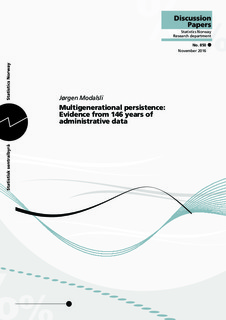Multigenerational persistence: Evidence from 146 years of administrative data
Working paper
Permanent lenke
http://hdl.handle.net/11250/2480659Utgivelsesdato
2016-11-21Metadata
Vis full innførselSamlinger
- Discussion Papers [1003]
Sammendrag
This paper uses Norwegian census data on occupational associations among grandfathers, fathers and sons from 1865 to 2011 and finds significant grandparental influence throughout the period.
There is increasing evidence that intergenerational transmission of economic characteristics goes beyond what can be measured by parent-child associations. However, existing studies are based on samples from small geographic areas or particular time periods, making it hard to know to what extent these multigenerational processes can be generalized across space and time, and how they depend on the measurement of economic outcomes.
This paper uses Norwegian census data on occupational associations among grandfathers, fathers and sons from 1865 to 2011 and finds significant grandparental influence throughout the period. In particular, the additional grandparental influence is strong for white-collar occupations. The findings are robust to alternative ways of measuring the characteristics of the parent generation, and to the use of income rather than occupation as a measure of economic status. Multigenerational persistence is found to have been stronger early in the period, before the establishment of a modern welfare state, suggesting that institutions play a part in how economic characteristics are transmitted across generations.
Persistence is strong also in subpopulations where generations grew up in different parts of the country. This shows that the grandparental effect is not exclusively driven by direct interpersonal interaction between individuals across generations.
